Helping Little Voices Grow Big.
Call Us for Speech Therapy in Atlanta
Helping Little Voices Grow Big.
Call Us for Speech Therapy in Atlanta
The therapists from SAGE Speech & Learning Associates will tell you that the speech therapy patients who make the most rapid progress are those whose families are involved in their weekly speech therapy sessions, and reinforce techniques at home daily. Fostering a team approach is paramount to success, and the speech pathologists at SAGE Speech & Learning are experts in helping each family make quick progress!
Speech Therapy is an exercise in successful collaboration. Not just between the Speech Language Pathologist (SLP) and the child, but between parents, teachers, doctors, and other professionals.
How many times have you been to the gym to exercise once a week and seen quick results? The answer is never! For long lasting, efficient and high quality results, children need daily practice and reinforcement. Working with a child's speech and language is the same as working with the muscles of the body. The brain needs daily practice for any skill to become automatic.
SAGE Speech & Learning is the ONLY practice in Georgia that is trained and certified to provide the Lidcombe Program for stuttering. Stuttering therapy in Atlanta is scarce, and much…
A compassionate and enthusiastic person who provides one-on-one help in the classroom for a child with diverse needs. A facilitator's goal is for their student to be successful in the…
Speech therapy is the evaluation and treatment of communication and swallowing disorders. Speech and language development usually follows a typical pattern in children. If you have concerns about your child's…
SAGE Speech & Learning strives to provide each family with a welcoming and knowledgeable team of specialists, each uniquely equipped to address the needs of your child. We refer to…
Your speech pathologist at SAGE Speech & Learning will provide you with weekly communication outlining your child's current goals and progress, along with practice items you can do daily. Practice doesn't need to take more than 10-15 minutes, and can often be done in between your regular daily activities. Our goal is to make consistent practice easy, convenient and fun.
Recently, founding therapist, Saren Schapiro, received an adorable gift from a family who recognized that their child's success was a team effort! Attached is a picture of the talking bear, who, when pressed, recites a thank you recorded by our successful client!
These little victories make the long days and hard work feel worth while!
An interesting excerpt of an article called The Powered Up Parent from the ASHA Leader (ASHA stands for the American Speech and Hearing Association) directly addresses the importance of parental involvement:
Encouraging Involvement
In my experience, parents who seek treatment from private practitioners are very open to participating in treatment sessions, especially if the SLP explains to a parent of a preschooler who stutters, "I only do this work with full parent participation." However, some parents of 3- to 5-year-olds receiving school-based treatment may not expect that method"”and the school-based SLP may not deny services if the parents decline to participate. SLPs can take several actions to involve parents and to maintain their participation in treatment.
Assign parents daily "special talking time" with their child after each session.
During this special talking time, parents implement the strategie they learned in treatment. I find that parents, who often juggle very busy home and work lives, look forward to spending 10 or 15minutes a day alone with their child, reading books and playing games. Many parents have thanked me for this assignment, saying they feel I am giving them permission to spend quality time with their child. For parents with several children, this special talking time may be the only time alone they have with their child who stutters. Some parents have commented that this special talking time has become the best part of their day.
Ask parents to complete a daily rating chart.
Once a day, typically after the child goes to bed, parents take a minute or two to fill out a daily stuttering rating chart. Using a 10-point scale, they rate the child's daily stuttering levels during structured time (the special talking time with treatment strategies) and unstructured times (the child's overall level of stuttering throughout the day). I also encourage parents to keep additional notes"”for example, if stuttering increases or decreases during certain activities or times"”that we can discuss at the next appointment.
Have parents begin to implement the treatment throughout the child's day.
Parents use the strategies at the dinner table, driving to school and in other everyday environments. The parent and SLP work together to decide when and how often to use the strategies outside of special talking time. Ideally, the parent is not being intrusive and or "nagging" the child. For example, a parent may use positive verbal contingencies ("That was nice smooth talking") too often. Sometimes a parent may use the same phrase repeatedly and need help expanding their praise repertoire. The SLP might ask the parent to identify five or six new phrases ("Great talking") and to use them"”although less frequently"”throughout the day.
Give parents stuttering resources"”but don't overload them.
The Stuttering Foundation of America offers a number of informative and inexpensive materials. I typically give or loan one to parents at the beginning of treatment, often Edward Conture's book, "Stuttering and Your Child: Questions and Answers." Most parents read or watch the materials and come in with questions and thoughts that help us in treatment. One parent recently said that she was reluctant to keep daily stuttering logs but was encouraged to do so after reading about the method. The mother explained that the first two SLPs she met with did not prepare her for the need to keep data and that the book helped her understand that data-keeping was important and not just "busy work." During a typical and recent treatment session, the mother and I agreed that her son came into the session stuttering at a level 5, which is a significant amount of stuttering. I began an activity using Demands and Capacities and Lidcombe strategies. After watching for about five minutes, the mother took over. Within minutes her son's stuttering dropped quite dramatically to level 2 and then level 1. The parents' daily data began showing that consistently, week after week, their child's stuttering was reduced and remained at levels 1 to 2.
To read the rest of this article, CLICK HERE!

At SAGE Speech & Learning Associates, we know that the best care for our clients comes from a collaborative approach. This…
Read More
At SAGE Speech & Learning Associates, we believe that early intervention is key when it comes to speech and language development,…
Read More
At SAGE Speech & Learning Associates, we are committed to providing personalized and specialized care for every child we serve. We…
Read More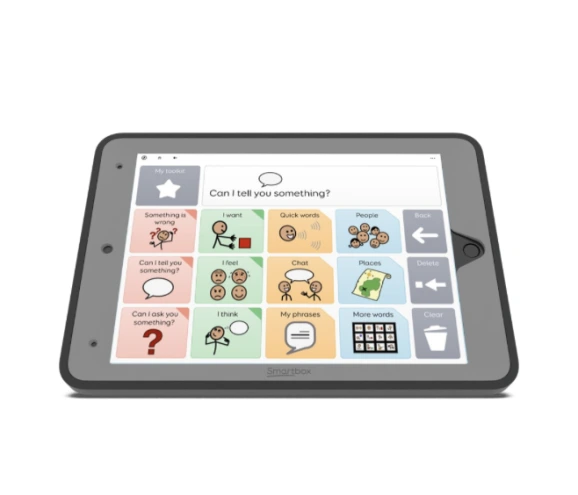
Exploring the Benefits of Speech Generating Devices in Speech Therapy: Insights…
Read More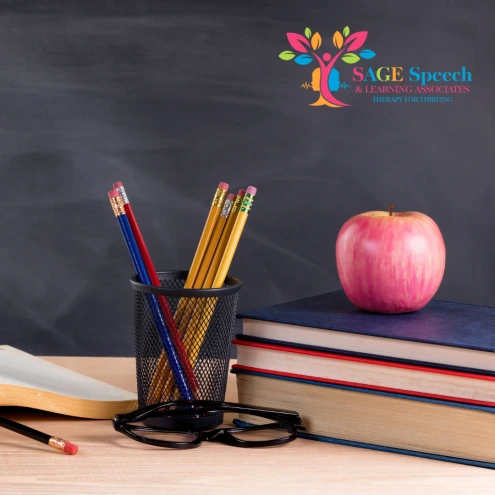
Has your school considered engaging SAGE Speech & Learning Associates? At SAGE Speech & Learning Associates, we recognize the vital role…
Read More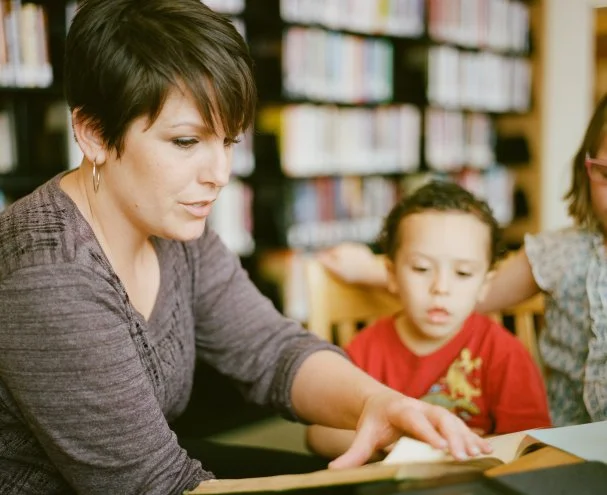
Fingers crossed, but it seems it that 2021 is shaping up to be a much better school year than 2020. We…
Read More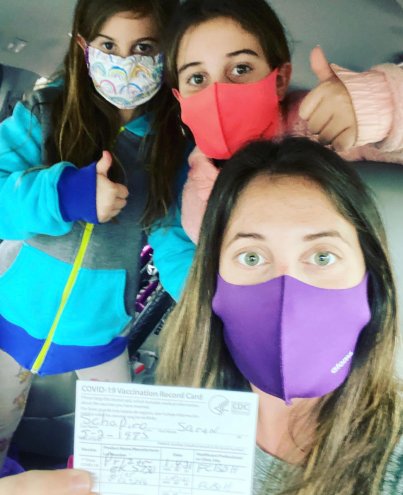
A Letter From Founder Saren Schapiro M.Sc., CCC-SLP Dear Colleagues, As the year rounds into the second quarter, I am touching…
Read More
Hello Clients and Friends, I want to thank you for being a part of our team in 2020. To have made…
Read More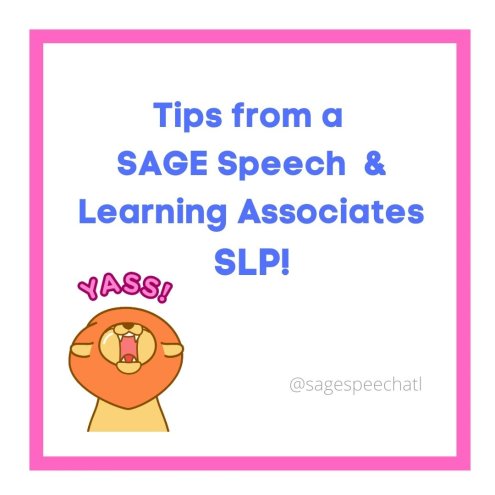
Discuss with the child out loud/verbally what's coming next--"First we do this, then this, then this, then done/lunch/play/etc" Bundle-up…
Read More
This is a question we never imagined we would have to answer. SAGE Speech & Learning has pivoted to teletherapy services…
Read More